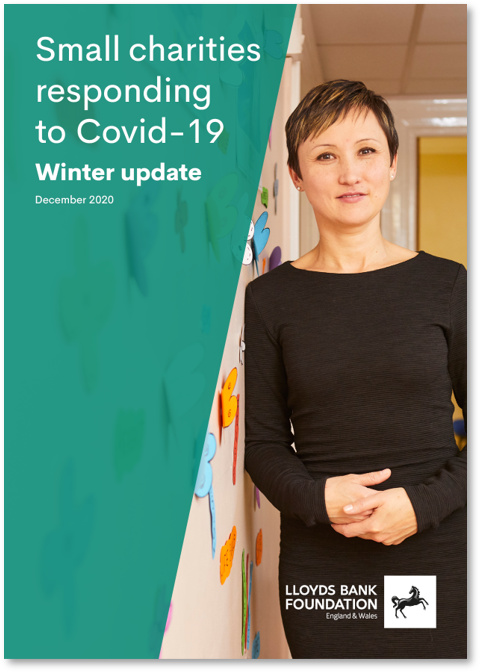
10th December 2020
“The story that emerges from across our grant portfolio is one in which small and local charities stepped up to the all-encompassing challenges of Covid-19 in their communities, adapting rapidly to the changing needs of their beneficiaries, staff, and volunteers.
The small charities funded by Lloyds Bank Foundation for England and Wales have been at the frontline of the local community response to COVID-19. This report shares how charities have sustained their response to the continued challenges of COVID-19.
Download the report here
Executive summary
This report is split into five key areas:
- Meeting the moment: the small charity response
The story that emerges is of charities stepping up to the all-encompassing challenges of COVID-19, adapting rapidly to the changing needs of the communities they serve, their staff and volunteers. Many charities continued to provide a consistent service by delivering remotely and pivoted to offer new services as they saw rapidly changing needs in their communities. Moving to online provision, for some charities, has led to more effective services, for example, those who support young people. The majority of charities are now operating a blend of remote and face to face services. - A collaborative response
Several charities have cited improvements in partnership working during the crisis. Charities have seen partnerships emerge quickly in ways they hadn’t done previously as responding to COVID-19 in their communities required collaboration. The strength of local voluntary sector infrastructure was critical in enabling a coordinated and non-competitive communitylevel response. Subsequently, charities have shifted to focusing on maintaining, rather than building relationships, so that behaviours don’t ‘revert to type’ when the initial health emergency subsides. - As small employers and organisations
At the same time as they adapted their services, charities transformed themselves as organisations and employers. Nowhere was this more evident than in digital transformation, where progress accelerated what might normally take years in a matter of weeks. In parallel, many charities have had to focus on supporting the emotional wellbeing and resilience of staff and volunteers given the pressures they were facing. Even in September and October, the legacy of lockdown on staff wellbeing continues to be a prominent theme – concerns of burnout as they are dealing with higher levels of need for a prolonged period, working remotely, as well as the personal impact of living through a pandemic. - Looking forward: reckoning with the legacy of the first lockdown
In the early months of the pandemic, whilst many charities were busier than ever, the circumstances meant there were reduced referrals. This included, for example, charities working on domestic abuse and sexual abuse charities as people were unable to access their services due to lockdown; criminal justice charities also faced many challenges as they were unable to access people in custody. However, charities aren’t expecting this to continue and are expecting they will then have a jump in referrals once this bottleneck passes. Charities are also predicting the long-term impact of the crisis. They are anticipating further challenges caused by increases in poverty and financial crisis, leading to greater demand for their support. - A funding crisis deferred
Many charities have lost income due to being unable to trade, fundraise or access grants due to closing programmes or changing criteria. Many funders responded to the emergency by providing shortterm funding and offering more flexibility to charities. However, there are growing concerns about long-term funding shortfalls, due to the timescales at which funding, including from government, was or had to be spent and the reductions in the length of grants.
About this report
This report captures the views and experiences of 180 small, local and specialist charities working in communities across England and Wales on the frontline of supporting people through Covid-19 and the first national lockdown. This is drawn from annual monitoring reports from the Foundation’s grant holders that were received between May and October 2020.
As part of their reports, charities are asked to reflect on both the challenges and successes of their work over the previous year. The Foundation uses this data and feedback to help us better understand the operating environment for charities, inform our current and future grant making practice, and respond to emerging charity and community needs.
